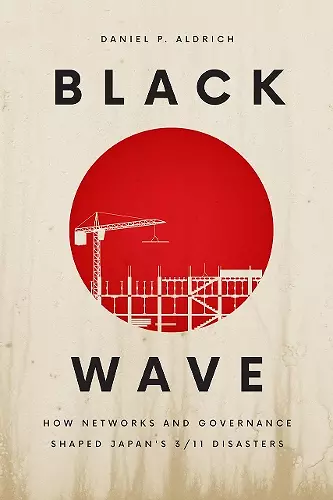Black Wave
How Networks and Governance Shaped Japan's 3/11 Disasters
Format:Paperback
Publisher:The University of Chicago Press
Published:22nd Jul '19
Should be back in stock very soon

Despite the devastation caused by the magnitude 9.0 earthquake and 60-foot tsunami that struck Japan in 2011, some 96% of those living and working in the most disaster-stricken region of Tohoku made it through. Smaller earthquakes and tsunamis have killed far more people in nearby China and India. What accounts for the exceptionally high survival rate? And why is it that some towns and cities in the Tohoku region have built back more quickly than others? Black Wave illuminates two critical factors that had a direct influence on why survival rates varied so much across the Tohoku region following the 3/11 disasters and why the rebuilding process has also not moved in lockstep across the region. Individuals and communities with stronger networks and better governance, Daniel P. Aldrich shows, had higher survival rates and accelerated recoveries. Less connected communities with fewer such ties faced harder recovery processes and lower survival rates. Beyond the individual and neighborhood levels of survival and recovery, the rebuilding process has varied greatly, as some towns and cities have sought to work independently on rebuilding plans, ignoring recommendations from the national governments and moving quickly to institute their own visions, while others have followed the guidelines offered by Tokyo-based bureaucrats for economic development and rebuilding.
"Much has written about the earthquake, tsunami, and nuclear accident that struck Japan in 2011. But few scholars can combine a deep knowledge of Japanese politics and society and a deep knowledge of contemporary research on the social response to natural and technological hazards. Aldrich is one such scholar, and this book sets the standard for scholarship in this field. The striking finding--that recovery among different communities in the most stricken areas of Japan was uneven--is likely to be of great interest to students of disasters, of technological hazards, and of contemporary Japanese politics."--Thomas A. Birkland, North Carolina State University "Three disasters--an earthquake, a tsunami, and a nuclear meltdown--struck Japan on 3/11, generating one of the greatest catastrophes in recent history. In Black Wave, Aldrich asks a series of essential questions: How did so many people survive? Why did some places fare so much better than others? What does it mean to be resilient in a world of emerging risks? His findings are surprising and important. Everyone interested in disaster--or, really, survival--should read this excellent book."--Eric Klinenberg, New York University, author of Heat Wave: A Social Autopsy of Disaster in Chicago
ISBN: 9780226638430
Dimensions: unknown
Weight: unknown
272 pages